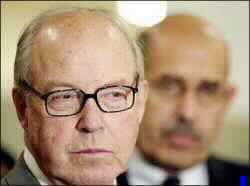- Author:
& News Agencies - Section:
WORLD HEADLINES
Iraq offers UN total cooperation; US criticises Annan

UN weapons chiefs left Iraq armed with promises of total cooperation for the resumption of disarmament inspections, but the United States hit out at the world body and returned to war talk.Hans Blix, head of the arms commission UNMOVIC, and International Atomic Energy Agency (IAEA) director Mohamed ElBaradei flew to a rear base in Cyprus stressing that Baghdad needed to back up words with action when inspections restart next week after a four-year break.
In Larnaca, Blix said they had "good discussions" in Iraq. "We were assured they will fully implement" UN Security Council resolution 1441, which gives inspectors sweeping powers.
Blix added that he was confident that "war can be averted.
ElBaradei said he and Blix had impressed on the Iraqis that inspectors want a "an accurate and complete report" of Iraqi armaments programmes by a December 8 deadline, and "they made it clear they will do everything possible to cooperate with us."
The verbal commitment "has to be translated on the ground."
"All Iraqi officials have committed to provide us full cooperation and full transparency, and I hope that we will see that next week when we resume our inspections" ElBaradei said Tuesday night after two days of high-level talks.
However, US Defense Secretary Donald Rumsfeld criticized the United Nations and argued that an increasing number of countries were ready to support possible military action on Iraq.
He played down a diplomatic rebuke to the White House from UN Secretary General Kofi Annan who took issue with US claims that Iraqi anti-aircraft fire directed at US and British warplanes patrolling "no-fly" zones constituted a "material breach" of resolution 1441.
"Let me say I don't think the Security Council will say that this is in contravention of the resolution," Annan said.
According to the terms of the resolution, which sets new tough conditions for weapons inspections, a "material breach" could constitute a legitimate reason for war.
US warplanes bombed Iraqi air defenses Sunday and Monday in response to missile and anti-aircraft fire that the White House said was in "material breach."
"I dont know that he necessarily reflects the UN," Rumsfeld said of Annan. "The center of gravity is the Security Council."
The zones set up to protect Kurds in the north and Shiites in the south from the Iraqi regime are not backed by specific UN resolutions.
Rumsfeld said support was growing for Washington if it decided to go to war with Iraq.
"We are getting responses every day," he said. "They fit in various categories. One category is (those who) like to be helpful and are planning now in the event that force is used with or without the UN resolution."
A top adviser to President Saddam Hussein, General Amer al-Saadi, said Iraq would meet a December 8 deadline to issue a report declaring all its weapons programmes -- nuclear, chemical, biological and missiles.
"We do not have any new programs and we will say so with all honesty, and we will present again the old programs, with additional clarifications," said Saadi, a weapons expert.
Resolution 1441, adopted November 8, gives Iraq one month to make a complete and accurate declaration of its programmes.
Blix stressed that the Iraqi government's contention that it no longer had weapons of mass destruction needed to be documented.
"If the answer of the Iraqi government were to be that there aren't any, then it must be convincingly shown, by documentation and by evidence," he said.
Blix and ElBaradei met Foreign Minister Naji Sabri, who assured them of Iraq's readiness to cooperate fully and "refute US allegations that Iraq has been producing mass destruction weapons in the absence of inspectors", thus leading to a lifting of UN sanctions.
Blix said most inspections would be on a "no-notice" basis, adding that "inspectors need to be able to go anywhere, any time, and this is agreed and understood well by the Iraqi government."
Blix and ElBaradei left behind a team of a dozen people to continue logistical preparations for the resumption of arms inspections on November 27.
US President George W. Bush, meanwhile, called for NATO's support for possible military action to disarm Iraq.
In Prague to take part in a NATO summit, Bush said that "if he (Saddam) refuses to disarm, then we will lead a coalition of the willing and disarm him. And, of course, I hope our NATO friends come with us."
In Berlin, a senior German official said NATO was drafting a statement underlining the alliance's support for "complete implementation" of resolution 1441.
The measure would not commit individual NATO states to military enforcement of the resolution if Baghdad refuses to comply.
PHOTO CAPTION
Hans Blix (L) and Mohamed ElBaradei


 Home
Home Discover Islam
Discover Islam Quran Recitations
Quran Recitations Lectures
Lectures
 Fatwa
Fatwa Articles
Articles Fiqh
Fiqh E-Books
E-Books Boys & Girls
Boys & Girls  Women
Women









